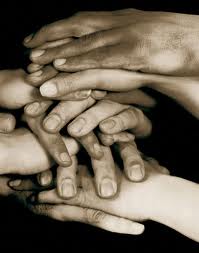I have this New Year’s resolution to embrace myself fully and with compassion. In my yoga practice, at work, when I’m with my friends, even the thoughts I have in my head when I’m alone. Complete and full acceptance. For a very long time I’ve believed I needed a critical narrator to monitor my actions and thoughts. It seemed like this voice was the most important factor motivating me to achieve goals I set, become a better version of myself, relate appropriately with others, even change the world. But that belief is going out with 2011. In its place, I’m hoping to cultivate a kinder attentiveness to myself that will not only improve my mental health, but help me feel more connected to others, passionate about my interests, even ambitious in my career plans.
A pitfall in attempting to be more relenting this year is critiquing the critic, so it’s important to remember my negative narrator has been developing for centuries as part of my human biology. It’s also been passed down through my Western heritage. Neuropsychologist Dr. Rick Hanson thinks our brains probably evolved to negatively appraise our environment because it was more adaptive, at one point, to be constantly on the lookout for predators and other potential threats rather than lackadaisical. And within my lifetime, I grew up in an educational system that evaluated me through my performance and position in a hierarchical grading system. While I did learn to succeed within that kind of system, I also learned to determine my value as an individual by being “better” or “worse” than everyone around me. This mode of evaluating people exists everywhere in our culture, from our mental health focus on self-esteem, to the debate between Democrat and Republican platforms about whether or not we should support people who don’t succeed in our competition driven economy. Indeed, studies have shown Americans lag behind their Buddhist contemporaries in places like Thailand for their ability to feel compassion for themselves. (Which is an adaptive thing to have even when you’re talking about success: more to follow below).
So now, with 25 years of self-monitoring and seeking approval from others to feel safe, I’m tired. Rationally, it seems insane to evaluate human beings by dividing them up and comparing them to each other. The usefulness of a type of intelligence, talent or skill varies in each new situation we find ourselves in and external circumstances fluctuate constantly. The reality of change makes it impossible to feel consistent about our value as human beings if we’re determining our worth based on outperforming others. What a way to stay miserable and constantly judgmental of ourselves and other people!
Interestingly, the Dalai Lama, a leader within the spiritual tradition that appears correlated to higher levels of compassion among its acolytes, says happiness is our birthright, the point of our lives as human beings, in fact. But, being the Westerner I am, it took me awhile to consider tossing out the competitive tendencies and critical judgments maintaining my melancholy. Then I read a few scientific studies that confirmed being kind to oneself actually supports some of my success oriented values. Dr. Kristin Neff at the University of Texas has created a self-compassion scale and has conducted numerous studies showing self-compassion is not only beneficial to our mental health, but is positively correlated to internalizing new information and mastering skills, feeling more consistently fulfilled and content, and feeling connected to others.
She writes in an article posted on http://www.self-compassion.org:
Self-compassion involves being open to and aware of one’s own suffering, offering kindness and understanding towards oneself, desiring the self’s well-being, taking a nonjudgmental attitude towards one’s inadequacies and failures, and framing one’s own experience in light of the common human experience.
Self-compassion offers a consistent orientation towards ourselves not dependent on performance or external variables. It isn’t positive thinking, which implies overlooking your negative qualities. Rather, it involves a very honest appraisal of yourself, your actions, your thoughts, and it means tending to them knowing you’re not alone. Neff points out in her articles there will always be someone “better” than you in whatever realm you pursue, so being too performance oriented is a pitfall for negative self-appraisal, can squelch our enjoyment of our activities, and ultimately, I would say, lead us to giving up on our dreams. She advocates instead for a kind understanding of ourselves and wish for our own well-being that we can carry with us as we attempt new challenges.
Her conclusions remind me of an experience during a yoga class I took with Kelly Roadhouse one time at Dharma Yoga. We were doing cartwheels back and forth on our mats and of course everyone had a “good” and a “bad” side. Kelly had us stop in the middle of our practice and squeeze our palms together. With the squeeze, she said, gather up all your thoughts about how other people in the class are doing this better than you or how bad you feel that one side is better than the other. Release your palms, exhale and let the thoughts go. Now try your cartwheel. Magically, my cartwheels were better. When I fully accepted myself and with intention, asked my abstract, negative thoughts to leave, I actually performed better. It was as though by releasing some of the anxiety I was experiencing around the potential of failure, I could devote more of my attention to the skill I was trying to learn. And giving up an attachment to the outcome of my cartwheels helped me keep trying when I felt awkward about my performance.
Neff has her own practices for increasing self-compassion.
Self-compassion practices not only support our success oriented goals, they increase our sense of ourselves as relational beings, which I think is a huge motivating factor for undertaking and supporting acts of social service. Compassion exercises increase our understanding of human interconnection in two ways. First, the techniques involve viewing ourselves as a friend would, or considering our common experiences and attributes we share with others. Neff notes that when people perceivably fail at a goal or are suffering in some way, they may “overidentify” with that experience and “exaggerate the extent of their personal suffering.” However, “The common humanity component of self-compassion… allows for the recognition of the related experiences of self and other, thus breaking the cycle of self-absorption,” she writes. So placing our own suffering in context can not only help us feel better, but it can increase our sense of empathy for others who are suffering, sometimes (or in the context of the world, often) even more than we are.
Second, we can learn to feel more compassionate for ourselves by tapping into the compassion we may more easily feel for others. In an OnBeing interview, social activist and yoga teacher Sean Corn says she always offers her practice to a higher power or another person.”When you’re offering your practice as a gift, the movement becomes so fluid because if I fall out of a pose, I’m not going to swear…I’m not going to blame…I’m not going to push…or strain, because I’m practicing with the intention of offering and I don’t want to send that energy out.”
It’s easy to incorporate yoga into our culture’s obsession with perfecting the body, or our competetive impetus to be “better” than the person next to us. However, Corn reminds us the asanas of a yoga practice are actually spiritual prostrations that can be offered up beyond our personal goals for achieving strength, flexibility or pride. Whenever I imagine devoting my practice to the alleviation of another person’s suffering, my tendency to critique my body’s limitations or a sometimes wandering mind seems to dissolve instantaneously. It’s as though by tapping into my feelings of love and acceptance for another person who may be suffering, I learn to attend to my body that way as well. So a devotional offering of our actions is actually an act of enlightened self-interest.
Devoting our time and resources to practical acts of devotion, such as volunteering, donating and working on behalf of the marginalized, can also teach us about what Roshi Pat Enkyo O’hara calls the “absolute value” of any human being, regardless of circumstances. In the article “Include Everything,” she describes her Street Retreat, four days spent sleeping on the streets and eating in soup kitchens. She concludes, “When anyone asks us to help them, what is the greatest gift we could give them at any given moment?…Wouldn’t it be to goad them to realize their own incomparable value and uniqueness? Isn’t that what we do when we offer the gift of our attention and love, when we include everything?” For O’hara, helping others appreciate their unique traits and absolute worth is the ultimate act of social service. Including everything, every action, every thought, every behavior, every person, as she says, is exactly what self-compassion practices help us learn to do, both for ourselves and those around us.
Having thousands of years of biological and cultural evolution working against my New Year’s resolution, I need scientifically, religiously and personally evaluated practices to increase my capacity for compassion. Ultimately, I think these practices can help us learn to act in ways that are creative rather than based on rigidity around how we or others might perform. This openness to creativity can help us value the idiosyncrasies and unique offerings of ourselves and others in any given moment. What a way to start a revolution.


